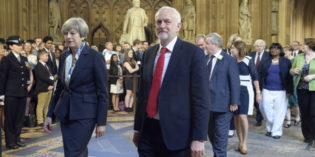Parliament

Does the online tool WriteToThem foster meaningful communication with constituents?
Some predicted the internet would be the silver bullet that could deal with the deficits of representative democracy. Others were less optimistic about its potential to foster democracy. Hartwig Pautz (University of the West of Scotland) looks at whether the e-democracy tool WriteToThem allows for meaningful communication between citizens and their elected representatives. Photo: Barry via a CC-BY-NC-SA […]

How Parliament’s campaign of attrition forced the government to open up about Brexit
The real battle over Brexit has not been about whether Parliament will get a final vote, writes Ben Worthy (Birkbeck University of London). The true fight is about information – about what kind of Brexit the government wants, and what its impact is likely to be. In this, Parliament has been rather successful. Pressure from select committees and […]

Everyone loves select committees these days. But have they really changed?
The Wright reforms have been widely credited with reinvigorating select committees. Stephen Bates, Mark Goodwin (University of Birmingham) and Steve McKay (University of Lincoln) take issue with this assumption. They found the reforms have made little or no difference to MP turnover and attendance, which are driven by the parliamentary cycle. When MPs are jostling […]

‘Desperately seeking an elderly gentleman with a large majority … to persuade Parliament to allow MPs to job-share’
Or a woman MP for that matter, write Rosie Campbell and Sarah Childs (Birkbeck). But they must be adored by their parliamentary and local constituency party so that both will be happy for them to stand as half of one of the first MP job-shares at the next General Election. We think it might take […]

Many government consultations are more about meeting legal requirements than listening
Consultations are often a legal requirement for government departments – but this sometimes means they are formulaic and ineffective. In an extract from his report, Creating a democracy for everyone: strategies for increasing listening and engagement by government, Jim Macnamara (University of Technology Sydney/ LSE) looks at some of the failings of government consultation, and […]

Audit 2017: How democratic is the Brexit process?
Many political and constitutional steps are needed in order to for the UK to leave the European Union, after 44 years as a full member. Cumulatively they form one of the biggest constitutional changes in British history, and one dogged by intense controversy and disputes. As part of our 2017 Audit of UK Democracy, Joelle Grogan examines […]

Why is it taking so long to appoint a new Intelligence and Security Committee?
For the past five months the Intelligence and Security Committee has been in abeyance. Yet its job of scrutinising the work of the security agencies is even more vital at a time when Britain is regularly attacked by terrorists. Andrew Defty (University of Lincoln) asks what is delaying the appointment of a new committee, and […]

Embattled political elites embrace democratic reform to save themselves
When they fear they are losing people’s trust, Western European governments start to bring in democratic reforms. The same thing happens when governments change frequently. Camille Bedock (Université libre de Bruxelles) looks at the recent upheavals in France and Italy – which contrast with Denmark, where people are generally happy with political institutions – and […]

Audit 2017: How effective is the Westminster Parliament in scrutinising central government policy-making?
The House of Commons is one of the oldest and foremost legislatures in the world – yet in the past it was also a byword amongst political scientists for weak legislative control of government. Recently some revisionist authors have painted a more active picture of MPs’ influence. As part of our 2017 Audit of UK […]



 Democratic Audit's core funding is provided by the Joseph Rowntree Charitable Trust. Additional funding is provided by the London School of Economics.
Democratic Audit's core funding is provided by the Joseph Rowntree Charitable Trust. Additional funding is provided by the London School of Economics.